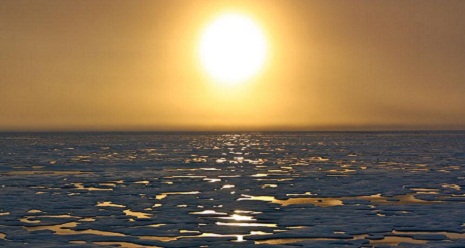Climate scientists fine-tuned simulations of future climate by adding ice‒ocean interactions and measurements that were more detailed than previously used. The tweaks reduce uncertainty in sea ice predictions by as much as 60 percent. The Arctic Ocean will go ice-free in the summer around 2052, nine years earlier than previously forecast, the researchers from the University of Reading in England predict online July 22 in The Cryosphere Discussions.
An iceless North Pole will open the top of the world to trans-Arctic shipping and could impact climate elsewhere, the researchers write.
Meltdown
Revised sea ice thickness estimates (bottom) suggest that the Arctic could be ice-free around nine years earlier than previously predicted. Ice is denoted by white and pale blue; as the blue darkens, the ice gets thinner, until the darkest blue represents open ocean.











.jpg&h=120&w=187&zc=1&q=100)








































